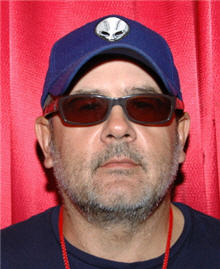Singularity Summit 2007: Artificial Intelligentsia

Guest post: This weekend I am at the Singularity Summit 2007 in San Francisco at the Palace of Fine Arts. About 800 people showed up to hear about the issues related to a future in which humans won't be the driving force in delivering scientific and technological innovations, eclipsed cognitively by "posthumans" or machine intelligences. I talked to four of the speakers prior to the event--the podcasts are here.

Prior to the event, Chris pondered the artificially intelligent future...
Academic receives a life sentence
A member of the Artificial Intelligentsia sat at his desk, his head gently banging against its edge, when his son walked in to see what all the noise was about.“ Daddy, what are you doing? Are you working?” asked Ludwig. ‘ Yes, I am, Ludwig.” “ What do you work at?” “ I am a mathematician,” replied the mathematician to his son. “ A mathemortician? What’s that?” “ Mathe-MA-tician. It’s someone uses numbers to make things better in the world.” “ How can mathemorticians’ numbers make things better?” “ By creating machines that are cleverer than human beings,” said the professor. “ But you can’t open a carton of milk, Daddy. How are you going to make a machine?” “ Oh, we have other people who do that. They all wear Dockers and like wrestling.” “ So you just think up the machines?” “ Yes.” “ Is it easy work?” “ No, not really,” said Ludwig’s Dad, scratching hard at the left knee that was sticking out of his old college shorts. “ You see, I have to think up a machine that will think like me, only better, and that will always try to do good things.” “ That sounds really hard,” said Ludwig, snapping one of his father’s pencils in two and putting the lead end up his left nostril.” Mom says no one thinks like you. I think it annoys her sometimes.” “ Yes, son, it does. She thinks I’m a narcissist with a tendency towards passive-aggressiveness. And I think she’s a manipulative and, oh, never mind… all people are difficult. Sometimes we don’t even know why we’re thinking things, so how can we design machines that think like we do, only better?” “ You just have to be a very clever mathemortician and forget about all your bad bits.” “ Yes, Ludwig. You’re right. I am very clever. So I will design without narcissism. And passive-aggressiveness. I will create numbers that will make machines that think for themselves. I will create machines that are cleverer than we are and, without any human help, actually make themselves even better.” “ Cool. Like robots. And Barry Bonds.” “ Well, er, yes. And I’m giving a speech about it at this big conference in San Francisco this weekend. I’m working on my speech right now.” “ Will you tell them what kind of machines you’re thinking up?” “ I will. As much as I can. Because the machines I’m designing are very, very complicated.” “ OK, Dad. I’ll leave you to it then.” With the pencil still wedged up his nose, Ludwig walked out of the room. His father watched him go. Then he took his hand off his knee and punched himself in the head very, very hard. With stars still floating in front of his eyes, he continued to write his speech: WHEN WE TRY AND CREATE AN INTELLIGENT MACHINE, THERE ARE AT LEAST 20,000 FACTORS TO TAKE INTO ACCOUNT. AND I… I MEAN WE… HAVE ALREADY MANAGED TO CREATE AN ENTITY THAT TAKES 43 OF THESE FACTORS INTO ACCOUNT. THAT DOES, HOWEVER, LEAVE 19,953 TO GO. BUT I AM OPTIMISTIC THAT WE CAN MAKE RAPID PROGRESS. THE HUMAN RACE IS, AFTER ALL, AN EXAMPLE OF HUGE PROGRESS IN A VERY SHORT TIME. IF WE’D TOLD GENGHIS KHAN- OR EVEN NAPOLEON- THAT, IN A FEW HUNDRED YEARS WE’D HAVE FLYING MACHINES THAT COULD DESTROY A MILLION PEOPLE AND LITTLE PILLS THAT COULD HELP MEN HAVE SEX FOR 36 HOURS, THEY WOULDN’T HAVE BELIEVED US. THEY MIGHT HAVE KILLED US FOR EVEN THINKING IT. (PAUSE FOR LAUGHTER) SO WE MARCH ON WITH THAT IN MIND, READY TO CREATE MACHINES THAT WILL LOOK AFTER THEMSELVES. AND HOPEFULLY LOOK AFTER OUR KIDS TOO. (PAUSE FOR LOUD AND PROLONGED LAUGHTER.) I THINK WITHIN THE NEXT 30 TO 40 YEARS OUR DREAMS MAY WELL BE REALIZED.”
When he had written these last words, the professor stopped, got up and walked toward the wall of his rather grand study. He got to the wall, leaned back and gave it repeated head butts. He didn’t pause to wonder why the head butt was, in the British Isles, called the Glasgow Kiss. Instead, his mind was enveloped by the frustrating enormity of the task ahead of him. He realized that it wouldn’t be 40 years. It would more likely be 140. Unless pharmaceutical companies made some massive and improbably inexpensive breakthroughs in that time, he would not be alive to witness the fruits of his endeavor. “ LUDWIG WAS RIGHT! LUDWIG WAS RIGHT!” he screamed. ‘ I AM A MATHEMORTICIAN!” Just then, his wife walked in. “ Don’t you ever stop thinking about yourself?” she said.